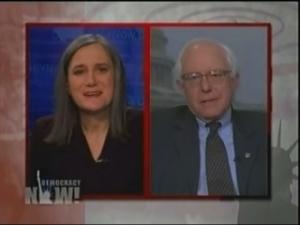From Democracy Now March 26, 2009:
We speak with Independent Senator Bernie Sanders of Vermont, who is attempting to block President Obama’s nominee to head the Commodity Futures Trading Commission, Gary Gensler, a former Goldman Sachs employee. “Gensler worked with Sen. Phil Gramm and Alan Greenspan to exempt credit default swaps from regulation, which led to the collapse of A.I.G. and has resulted in the largest taxpayer bailout in U.S. history,” Sanders said.
Transcript below the fold.
Sen. Bernie Sanders, independent senator from Vermont. He was elected to the Senate in 2006 after serving sixteen years in the House. He is the longest-serving independent member of Congress in American history.
AMY GOODMAN: Independent Senator Bernie Sanders is attempting to block President Obama’s nominee to head the Commodity Futures Trading Commission, Gary Gensler, who is a former Goldman Sachs employee. Sanders said in a statement that Gensler worked to deregulate electronic energy trading and exempt from regulation credit default swaps from regulation, which led to the collapse of AIG and has resulted in the largest taxpayer bailout in US history.
Senator Sanders joins us now from Washington, D.C., independent senator from Vermont, elected to the Senate in 2006 after serving sixteen years in the House, the longest-serving independent member of Congress in American history.
Welcome to Democracy Now!, Senator Sanders.
SEN. BERNIE SANDERS: Good to be with you, Amy.
AMY GOODMAN: Why don’t you want Gensler to be confirmed?
SEN. BERNIE SANDERS: Well, I don’t believe that we need more of the same old same old. The philosophy that Gensler espoused when he was working for Bill Clinton in the Treasury Department was strongly deregulation, was the Robin Rubin theory of economics. And in many respects, accentuated by eight years of George Bush, that type of deregulation activity, the repeal of Glass-Steagall, the putting derivatives under the radar screen, deregulating that and allowing these transactions to take place without public notice, these are the actions that took us to where we are right now.
I happen to be a very strong supporter of President Obama. I think he’s doing a great job in many, many respects. But I think, in terms of his financial advisers, he has people who have come from the Wall Street crowd who are looking at the world in a certain way, and I want to see some different points of view involved in this discussion.
AMY GOODMAN: Well, explain exactly what Gensler did, exactly what your concerns are around the issue of credit default swaps. And explain what these are, because I think why so much of this has happened is that regular people don’t understand what this is all about.
SEN. BERNIE SANDERS: Well, Amy, not only do regular people not understand; very few people understand. And that’s exactly what the problem has been.
We—during the Depression, what the government did is said, “Look, we’re going to have to regulate Wall Street, and we’re going to separate—have walls separating, for example, consumer banks, regular banks from investment banks, from insurance companies, because when you put all of these huge institutions together, when they fall, they cause systemic damage, and they can bring down the entire economy,” which is exactly what we’re seeing right now. And the legislation that was put into practice in the early 1930s was called Glass-Steagall, after two members of the Congress.
What people like Gary Gensler did, with Bob Rubin, with Phil Gramm, with Alan Greenspan, accentuated in the last eight years by George Bush, was to deregulate, deregulate, deregulate. And I used to have great debates with Alan Greenspan, who would come before the House Financial Institutions Committee and say, “Look,” in so many words, “greed is good. If you get government off the backs of Wall Street, if you let these guys do their magic and make all of these investments and don’t regulate them, somehow or another we’re going to have prosperity for all of the people in our country. That’s what we need to do.” I never believed that. So, what happened under Clinton, accentuated under Bush, was a massive effort at deregulation.
Just think for a minute that you had Bernie Madoff running a $60 billion Ponzi scheme, and Bush’s SEC couldn’t discover it. And the reason for that is that anything that Wall Street did, anything that corporate America did, was good, and you don’t want the government investigating or regulating.
And unfortunately, Gary Gensler was in the middle of that. Gensler, as part of the Treasury Department under Robert Rubin, pushed for the repeal of Glass-Steagall, the breakdown of those walls, which have led us precisely to where Citigroup is today, where AIG is today. So, essentially, this is a hard-working guy. He is a decent guy. I don’t have any animus against him personally. But I think President Obama has brought around him a lot of the Rubin mentality, which is not only deregulation, it’s unfettered free trade. And I think we need some more progressive-type thinking to advise the President.
You can watch the rest of the interview and read the full transcript at Democracy Now's web site.

















